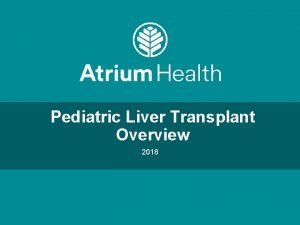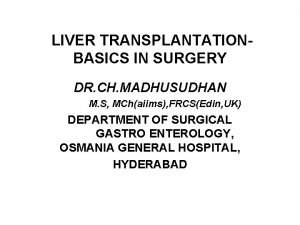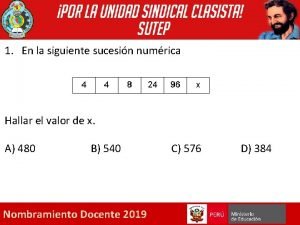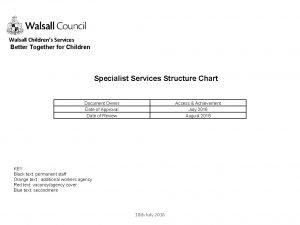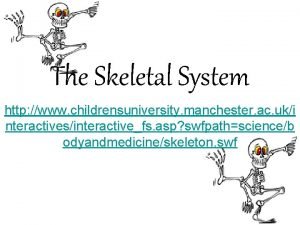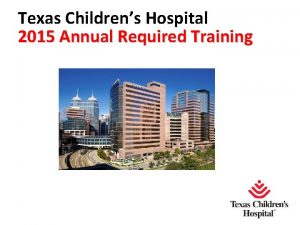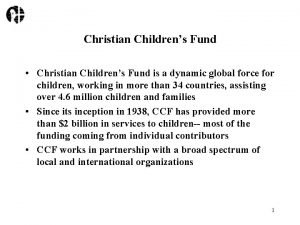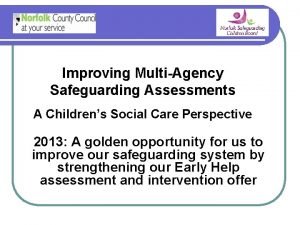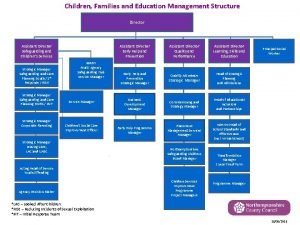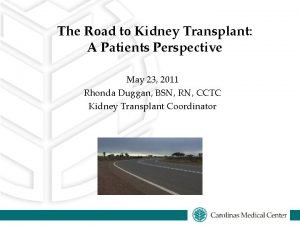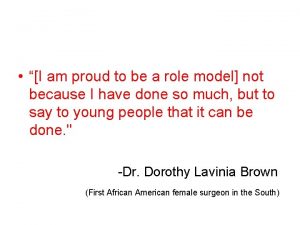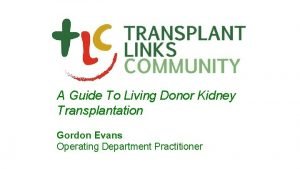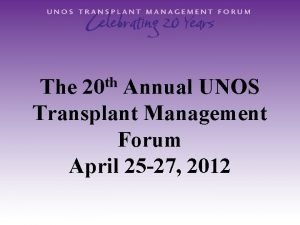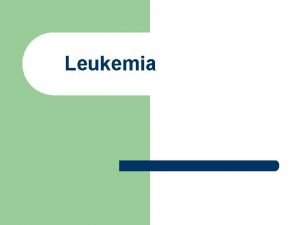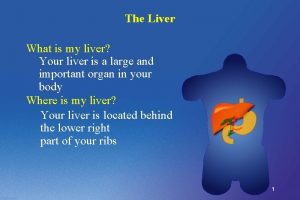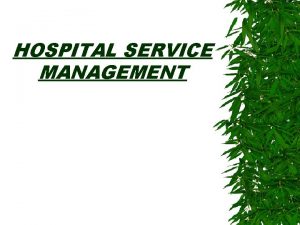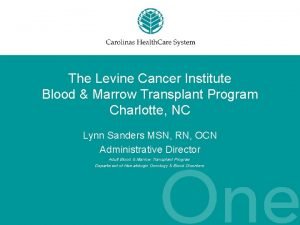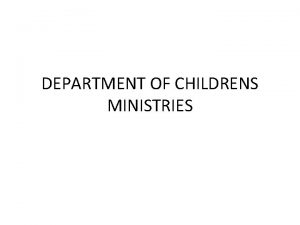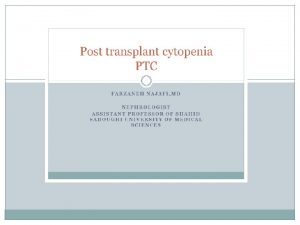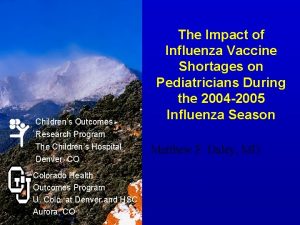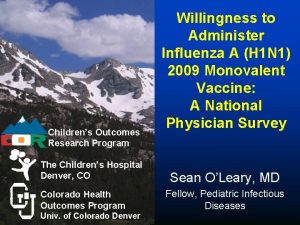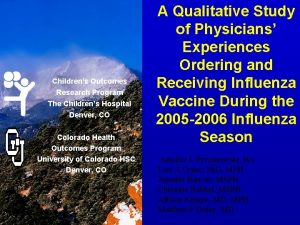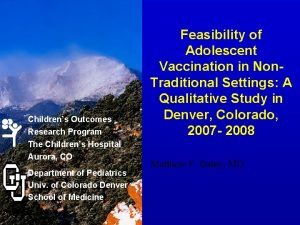Pediatric Liver Transplant Overview 2018 Levine Childrens Hospital




























- Slides: 28

Pediatric Liver Transplant Overview 2018

Levine Children’s Hospital Carolinas Medical Center

Pediatric Liver Transplant Program: Our Team • Transplant Surgeons • Lon Eskind, MD, Surgical Director • David Levi, MD • Vincent Casingal, MD • Mid-Level Providers • • Mary Alice Boulware, ACPNP Michael Filsinger, PA Alexzandria Messer, PA Ashley Wagner, PA • Transplant Hepatologists • Vani Gopalareddy, MD Medical Director • Ameesh Shah, MD • Daniel Rory Kelley, MD • Pharmacists • Kevin Cooper, Pharm D • Bennett Noell, Pharm D • Joslyn Brown, Pharm D

Pediatric Liver Transplant Program: Our Team Medical Social Workers Program Assistant • Katie Boulware, MSW Clinical Dietitian • Arlecia Phillips, RD • Rebekah Regenfuss, RD RN Coordinators • Cathy Opladen, RN Business Manager • Michael Daniels Financial Coordinators • Leah Wilson • Katie Reynolds • Crystal Reinhardt

Criteria for Referral Cirrhosis/ End Stage Liver Disorder Acute Liver failure Liver tumors Chronic Liver disorders

SRTR: Pediatric Kidney Report January 5, 2018 100 Pediatric (<18)100 patient 99. 62 survival 95(first transplants) 99. 76 98. 41 100 90 80 70 60 50 40 30 20 10 0 1 -mo. (1) 1 -yr. (2) 3 -yr. (3) Observed 100 98. 78 National 91. 30 Pediatric (<18) 97. 88 graft survival 100 80 60 40 20 0 1 -mo. (1) 1 -yr. (2) 3 -yr. (3) Observed National 91. 18

Transplant Statistics • These and additional statistics may found at • www. unos. org • www. ustransplant. org • www. optn. org

The Transplant Process 1. Referral received and reviewed for appropriateness 2. Insurance approval obtained 3. Patient scheduled for Transplant Evaluation Then… Evaluation Wait List Transplant Follow up

The Evaluation Process Appointments: Transplant Coordinator/NP Social Worker Financial Coordinator Transplant Nephrologist Dietitian Transplant Surgeon Urologist as needed Infectious Disease Physician as needed Child Life Other tests/consults as needed Patient responsibilities: Immunizations updated Bring completed paperwork mailed to at time of evaluation scheduling Discuss living donation with family and friends Both parents/guardian must be present for evaluation. If both parents are not actively involved in healthcare, parent must bring an adult support person.

Multidisciplinary Support • Social Worker • Assessment of readiness and needs • Financial Coordinator • Verifies insurance benefits, explains expected costs • The cost of medication after transplant is one of the BIGGEST financial concerns for transplant patients • Dietician • Performs a nutritional evaluation • Provides general recommendations to ensure good nutrition prior to transplant

Approval Process • Evaluation completed • Multi-Disciplinary team meets to discuss each patient’s candidacy • Collective team decision • Proceed with either listing, not listing or further testing

Listing Patients are not Wait Listed for a kidney until: • Completion of pre-transplant evaluation • All health maintenance has been received (immunizations, dental clearance) • Transplant Team medical approval • Insurance company approval Patient is notified by a phone call and a letter within 10 days of being placed on the kidney Wait List!

Waitlist- Patient Responsibilities • Update Demographics • Insurance Changes • Changes in Dialysis • Travel/Vacation • Cross Match Tube to Immunology Lab (q 30 days if actively listed) • Update health maintenance as recommended • Maintain weight goals • Remain compliant with treatment • Medical condition changes • Surgery, hospitalization, blood transfusions

Waiting Time Priority is given for the following reasons: • Dialysis start date or labs showing kidney function (GFR) < 20 ml/min. • Patients with increased PRA (antibody level), which makes finding a compatible kidney more difficult. • Pediatric candidates (age < 18).

Re-evaluation • Once actively listed, will require annual re-evaluation in order to maintain listing status. • While awaiting transplant, if the patient is not followed by our nephrology group, they must be seen by our transplant nephrologist biannually at a minimum. These visits could be requested more frequently if increased concerns/complications.

CMC Kidney Transplant Program: Supply and Demand Number of CMC Kidney Transplants vs. Candidates on Waitlist 712 771 802 788 633 568 540 470 502 326 225 168 2006 138 132 147 171 2007 2008 2009 2010 129 118 107 108 105 2011 2012 2013 2014 2015 2016 Transplants Waitlist

Discharge Process • Goal is to discharge by post-op day#7 • Written test evaluating transplant knowledge • Follow-up appointments are in Charlotte • Home Equipment • • Scale (not provided) Thermometer Machine Blood pressure monitor Pill box

Follow up Pediatric Nephrology: LCSC • All follow-up care is in Charlotte at discharge • Typically labs and physician follow-up is 3 times weekly after discharge for the first month • Labs and visits taper the further out from transplant if no complications • Goal is to transition patient back to primary nephrologist for shared care 6 months after transplant

Housing Options for Patients Ronald Mc. Donald House of Charlotte • Within a block of Levine Children’s Hospital • 35, 000 square foot home • 28 guest rooms with private bathrooms • Laundry facility with supplies • Meals prepared nightly • Large communal spaces (living room, playroom, outdoor playground) • Provided at no cost to patient/family

Housing Options for Patients Hospitality House of Charlotte: • • Located adjacent to hospital 22 room/44 bed facility Staffed 24/7 Large double kitchen Laundry facility with supplies Close proximity to grocery stores, restaurants, etc. Provided at no cost during evaluation stage

Long-Term Risks of Transplant • Rejection • Infection • Recurrence of primary disease (i. e. FSGS) • Malignancies – solid organ, skin, lymphoma • High blood pressure • Diabetes • High cholesterol • Coronary artery disease


Who Can Be a Kidney Donor? • Over 18 years old and in good medical health • NO high blood pressure, diabetes, history of cancer or other chronic medical problems • Donors are evaluated by their own Living Donor Team • Donors are informed of the risks of kidney donation and can change their mind at any time • Life expectancy & quality of life is the same as the general population • Donor testing, evaluation and surgery is covered by recipient’s insurance Donor safety is as important to us, as it is to you!

Compatible Blood Type- Living Donor Recipient O O A, O A B, O B AB, A, B, O AB Average waiting times on the waiting list vary according to blood type.

Kidney Paired Donation What if…. My Donor is not the same blood type? Size and/or age of donor and recipient different? Crossmatch is Positive? Donors can still donate for you but not directly to you. Kidney Paired Donation.

Living Donor Statistics Did You Know…. . • Shorter waiting time to receive a transplant • The less time on dialysis, the better your long term outcomes may be • Better transplant results • Living donor kidney transplants last longer. (Median transplant lifespan 8 -12 yrs [deceased] vs. 15 -22 yrs [living]) • Longer lifetime benefit from transplant

Now that you Have Found a Living Donor, What’s the Next Step? ? Share our contact information CMC Transplant Living Donor Office 704 -355 -3602

Contact Information Carolinas Health. Care System Transplant Department PO Box 32861 Charlotte, NC 28232 1 -800 -562 -5752 or 704 -355 -6649 (option #4) Fax: 704 -446 -4875 Transplant coordinators: Kristin Davis, ACPNP, BC Megan Germino, RN, MSN office: 704 -381 -6867 December 2014 office: 704 -381 -5410
 Levine childrens
Levine childrens Heterotopic liver transplant meaning
Heterotopic liver transplant meaning Mt washington pediatric hospital feeding clinic
Mt washington pediatric hospital feeding clinic National pediatric hospital phnom penh
National pediatric hospital phnom penh B a f c j e
B a f c j e World book day quiz
World book day quiz History of childrens literature
History of childrens literature Walsall childrens services
Walsall childrens services Childrens university of manchester
Childrens university of manchester Texaschildrens moli
Texaschildrens moli Colorado children's book award
Colorado children's book award 23 april international children's day turkey
23 april international children's day turkey Longman children's picture dictionary
Longman children's picture dictionary The christian childrens fund
The christian childrens fund Kirklees safeguarding childrens board
Kirklees safeguarding childrens board Fever in toddlers when to worry
Fever in toddlers when to worry Black childrens memorial
Black childrens memorial Childrens services
Childrens services Disadvantage of kidney transplant
Disadvantage of kidney transplant Kidney donor transplant
Kidney donor transplant Allogeneic stem cell transplant
Allogeneic stem cell transplant Next
Next Face transplant
Face transplant Slk transplant
Slk transplant Kidney donor transplant
Kidney donor transplant Pichere pasare
Pichere pasare Leukemoid reaction
Leukemoid reaction Embryo transplants gcse biology
Embryo transplants gcse biology Bone marrow transplant diet
Bone marrow transplant diet
